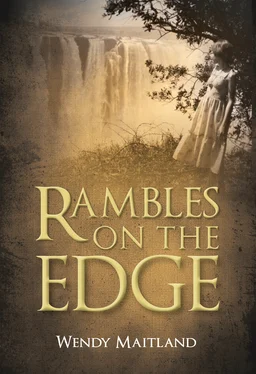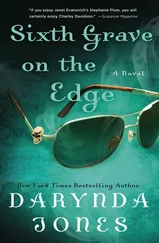Ros was still working at Bart’s Hospital in the medical art department where they were developing a teaching aid for medical students which was innovative at the time. It offered desks with video screens displaying a menu of clinical subjects, accompanied by illustrations and films of surgical and other procedures. Her ‘new friend’, as Muz called him, was Gary Pritchard, a Fine Arts graduate like herself. He was Welsh, from a mining family in the valleys, an only child, talented and ambitious. He had won a scholarship to the Royal College of Art in London and from there joined BBC Television as a set designer and was a good foil for Ros, scooping her out of the dark corners of Craddock muddle with a hearty attitude that he applied to all aspects of life. He was a generous and flamboyant character who exhibited quantities of Welsh charm along with a lilting Welsh accent, so that even Muz allowed herself to be teased and complimented when Gary was visiting. But for Andy he had nothing but scorn. ‘A total waster,’ was Gary’s comment on the hapless Andy.
David phoned or wrote from his mother’s house, and if Muz answered the phone he smoothed her suspicions with a Sandhurst drawl put on to disarm her. ‘Your army friend is a perfect gentleman,’ she commented after one call. ‘He has lovely manners. He didn’t ask straight away to talk to you, but asked me about myself and we chatted for quite a long time. What a nice man. Why don’t you ask him over?’
‘He’s too far away, and there isn’t time,’ I told her. But I missed him and so did the children. They had become attached from an early age when happy hours were spent with him and his children in Kenya while his wife was often away. He was an inspired inventor of games for them, such as constructing mini-assault courses with water features and rope bridges, combining energetic activity with mad frolics and dogs joining in. But he was just as happy to sit down with the rest of us for a few hands of cards, a glass always within reach.
I had to acknowledge the intense affinity that had grown up between us, emphasised by this latest encounter, while also acknowledging that it could be no more than a momentary distraction from our own entirely separate commitments. His wife wanted to stay in Nairobi where the gracious life of expats suited her, while David was determined that his son and daughter should join him in England and have an English education. His focus was on them and his career path in the British Army, intentionally putting aside other considerations while not wanting to put me aside altogether, but I had my own focus and it remained far from England. Such a rare type of person is hard to let go, I thought, and Louise echoed these thoughts when she said: ‘I wish David could come to Rhodesia with us. He’s my friend as well as yours, you know.’
The aunts were insistent on a last visit to Howleigh and I was glad afterwards that there would be no more complicated train journeys with luggage and small children after the latest experience, when we had to change trains several times to reach Taunton. On one of these legs the train was packed tight like the Delhi Express as I squeezed in, carrying Peter, pushchair, suitcase and bags, with Louise and Simon clinging to my coat, terrified that they might get swept away in the crush. Once safely on board I thrust Peter onto the lap of a surprised woman sitting in a crowded carriage while I went to search for spare seats. She looked greatly relieved when I returned to retrieve him, and he looked even more relieved, as he could never be quite sure when he might find himself forgotten during the uncertainties that accompanied our nomadic life. When we all spilled out at Taunton it was a further relief to find the aunts waiting on the platform, ready to fold their arms around us and make us feel safe again.
It was a brief visit followed by sad farewells when we had to leave all too soon, the aunts coming to help us onto the train as they brought along assorted carrier bags full of presents for Adam and his parents, that had not been wrapped. These objects kept falling out of the bags as I tried to keep all my pieces of luggage together. The presents included a pair of stirrups with leathers (bound to come in useful, the aunts said), knitted socks, pots of Marmite and Gentleman’s Relish, garlic grown in the garden, long rubber waders that had belonged to their father Percy, and homemade marmalade. All of these had to be jammed into suitcases a few days later when we left to go home, facing another tortuous journey.
This time I was changing planes with six pieces of luggage and three small people whose heads I had to keep counting to make sure none had gone missing. When we reached Cairo airport it was a vast milling multitude of people camping out like refugees; whole families with bedding spread out and barely an inch of space between them. I needed to find lavatories and a nappy-changing space for Peter, hoping there would at least be running water for a wash. When I located the reeking conveniences and put Peter down on the filthy floor to change him, it felt like being in a war zone and I was thankful beyond measure that our next stop would be Johannesburg.
The previous day, leaving this time from Heathrow instead of Gatwick, David in a final gesture of kindness had booked rooms at a hotel near the airport for us, and had come to help with all the details of departure and make sure we got off in good order. That evening, putting the children to bed, they asked, ‘Are we leaving David behind again?’ As ever, children’s remarks can be keenly perceptive, and our departure the next morning was no less emotional than a year before at Nairobi when we left for Rhodesia with every one of us in tears, including David. He was left behind again, to return to his regiment and single life in England, his own children still far away, while my future had to be in Rhodesia, making things work for us.
CHAPTER 2
Adam had driven down to Johannesburg to meet us and was standing at the arrival gate with a nervous smile and big bouquet of red roses.
That was a tender moment as the children ran to him and we all stood clutching each other in a huddle among our motley assortment of bags and baggage. We had a long drive ahead, but Adam had booked comfortable places to stay along the several hundred mile route, going north through the Transvaal to the Limpopo border and home.
None of the Transvaal shopkeepers or hotel people we met on the way seemed able or willing to speak English on the long dusty trail, until at last we reached a beautifully cool and refreshing mountain retreat called Louis Trichardt, on the South African side of the border. We spent the night there gratefully, looking forward to a hot bath, stiff drink and good dinner, after putting the children to bed. Locating the hotel bar I went in with Adam for that urgent gin and tonic, to be told that ladies were not allowed to drink with men and there was a cocktail bar where I could have a drink with other ‘ladies’. This was a surprising restriction: like an apartheid against women, in an otherwise friendly hotel. In the cocktail bar I took the opportunity to introduce myself to those women who had no objection to speaking English, and find out what they thought about the rule. ‘It’s lekker (great) getting away from the men,’ they laughed. ‘We don’t want them with their guns and rugby bullshit. Keep them out!’ Apartheid was on the other foot here it seemed.
Gwelo was another three hundred miles north from the border driving via Bulawayo where we spent the next night and then, when we were nearly home, Adam delivered a piece of news that was deeply unsettling. ‘I didn’t want to tell you while we were enjoying ourselves, and I didn’t want to depress you when you had only just arrived,’ he began in the same ominous tone that Fa used when about to deliver a torpedo into the conversation. If any kind of disaster was about to be announced I wanted to hear it fast and straight. ‘Yes?’
Читать дальше












